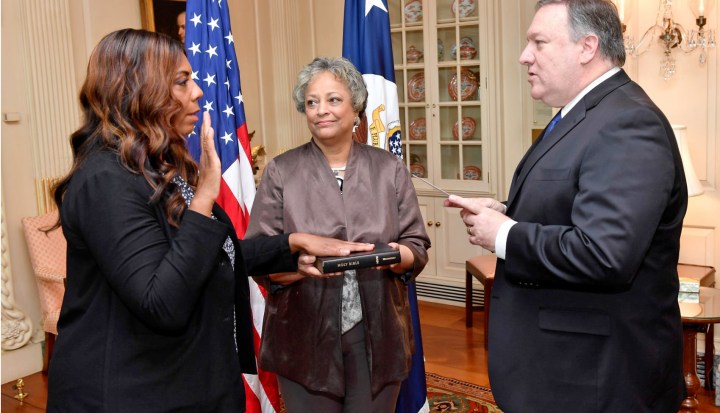TRUMP WHITE HOUSE
Trump Gains a policy hardline Reaganaut for a key State Department post

Sometimes the important personnel changes in Washington are with the jobs that don’t make the headlines. Meet Prof Kiron Skinner.
If readers have been paying any attention at all to the stranger than fiction goings-on in Washington, they will have put their lurid, half-finished Washington political novel back under the bed for another time. The actual fiction of the real Washington right now just about beggars the imagination.
The ongoing confirmation hearings for a new appointment, a federal appeals court judge, Greg Kavanaugh, to the Supreme Court have been met with wrangles over tens of thousands of pages of documents produced during his time in the George W Bush White House that had been withheld from the Senate Judiciary Committee. Then there have been those protesters at the hearing, sometimes women dressed in costumes plucked from the book/television series, The Handmaid’s Tale. This has all been in response to continuing questions about Kavanaugh’s views on the decision in Roe v Wade that established the broad right to abortion in America, more than two generations ago.
Given that Republicans currently hold a slim margin in the Senate – the body that must say yea or nay or court appointments – Kavanaugh’s appointment will almost certainly prevail, unless something truly egregious suddenly pops up from all the documents now being examined by staffers. But the likely confirmation may end up being both awkward and embarrassing – even in victory. And there is the smouldering question of whether or not Kavanaugh, as an associate justice of the Supreme Court, would recuse himself in the event that any cases involving Donald Trump’s shenanigans or worse reach the court, once Kavanaugh is confirmed as a judge there.
Meanwhile, prize-winning investigative journalist Bob Woodward’s new book, Fear, detailing a Trump White House consumed by increasingly desperate efforts by senior officials to somehow restrain, deflect, or outright out-manoeuvre the president from committing some bizarre act or going off the rails entirely. Each of the officials quoted are busy denying they spoke on this topic with Woodward or that they said the words he quoted him on. (Or, perhaps, that they had ever met or heard of Woodward.) However, much of Washington is busy playing the game show: Who Do You Trust – Donald Trump or Everybody Else?. But there has been more to come and the week was not yet over.
On Wednesday afternoon, the New York Times published its first-ever anonymous Op-Ed column, I Am Part of the Resistance Inside the Trump Administration. Making some of the same kinds of charges as Woodward’s book – and describing an amoral, unprincipled man in over his head – the column was reportedly penned by a current senior official, and Trump is already calling it “treasonous”.
Meanwhile, astrologers, psychics, telekinesis experts, and amateur graphologists are trying to find out who the miscreant is – or, worse, miscreants are. Any moment now and there will be a call for traditional soothsayers to come to Washington to help sniff out this traitor. This, obviously, is not how any government in the 21st century is supposed to work. Suspicion and paranoia are now in the saddle and they are riding the White House. Especially one where the top guy has that “big red button” on his desk.
At the same time, in the government itself, amazingly, there are the occasional moments that may signal business as usual, or at least nearly usual. Over at the State Department, Secretary Mike Pompeo’s office announced the newest member of the senior cadre of officials in that department. In this case, it was to introduce Prof Kiron Skinner as the head of policy planning. Skinner has been a serious academic at Carnegie Mellon University in Pittsburgh as the Taube Professor of Politics and International Relations, until her appointment, and she has written several books on the late Ronald Reagan, as well as several other volumes.
There was an incumbent in that position put there by the recent former (and now significantly unlamented) secretary, Rex Tillerson. Tillerson had come to the government from a career in the oil business, and he lasted around a year before being pushed out by a president who had first made such a big thing about how that business experience would make such a difference in government. His replacement, Mike Pompeo, was shifted to the State Department from being head of the CIA, after years as a Republican member of the House of Representatives.
Tillerson’s chief of policy planning had been Brian Hook, and he has been shifted to something called the Iran Action Group. Sounds like a bit of a downgrade, although since Iran occupies a place in the president’s mental landscape such that it is almost unparalleled, Hook will presumably now spend his waking (and sleeping) hours trying to figure out how to get the Iranian government to do what the Obama era Joint Accord hadn’t done – end Iranian missile development, end its support for the Syrian government of Bashar al-Assad, and end its dark mutterings directed against Israel.
Still, some analysts view this Hook assignment as more symbolism than substance.
“There were no new resources, no new strategy, and no new authorities announced [for the action group],” said Brett Bruen, a former US diplomat who now runs the Global Situation Room, a Washington consulting firm.
“Instead, it should be interpreted as a typical Washington move to create the appearance of action by putting in the title.”
Still, as Foreign Policy magazine explained, Hook had been significantly unpopular with career diplomats at the State Department, many of whom blame him for driving a number of seriously admired colleagues from government service in order to suck up to the White House and ex-secretary Tillerson. It said:
“One official contacted by FP welcomed the news of Hook’s reassignment but expressed disappointment that he would remain at the State Department.”
Clearly not much love there. But we digress.
This Office of Policy Planning – not well known abroad – can be a real powerhouse bureaucratically. The first head of that office had been the legendary diplomat, George Kennan. He was the man behind the policy of US containment of the Soviet Union in the wake of growing Soviet challenges after World War II, and he had written the famous Mr X article, The Sources of Soviet Conduct, which had been based on his secret telegram sent to Washington when he had been serving in Moscow. With a secretary of state who treats ideas about policy seriously, the head if this office can lead the government’s thinking about the problems of today – as well as those still over the horizon.
But in many administrations, this office has been shouldered aside by either the various geographically defined regional bureaus that are in charge on a day-to-day basis with relations with the countries in their respective ambits – Europe, or South Asia, or Africa, for example – or, alternatively, by the various thematic functional bureaus that focus on broad issue areas such as nuclear nonproliferation, or environmental issues, or even by both types of bureaus. (Of course it is also astonishing and extraordinary for a US president to make foreign policy decisions at 04:30 and then announce them electronically, without speaking with anybody who knows anything about the question, as South Africans recently learned from a certain tweet on land.)
But this policy planning office is only as important as the secretary of state allows it to be. Every now and then that office really does work as the secretary’s brain-trust and in-house think tank (the original intent when it was first set up), steering strategy and foreign policy. But, more typically, it is unable to compete with those much bigger staffed regional bureaus and so its staff ends up writing speeches and handling specialised, niche projects such as Northern Ireland. As a long-serving diplomat with wide experience in Washington reminded this writer:
“Virtually every memo in the building has to be cleared through policy planning which either empowers the small staff – or stretches it very thin, depending on the issues and the individuals.”
As a result, here is why Secretary Pompeo’s choice for this position is so interesting. Prof Kiron Skinner seems a slightly unusual choice for the Trumpians. She has written several best-selling books on Ronald Reagan’s presidency, and, in her career so far, and in her new appointment, she has been loudly cheered by statements from analysts associated with those reliably conservative think tanks in Washington, rather than from Trump’s alt.right fan base.
She worked her way to two advanced degrees from Harvard via an associate degree from a community college, then a first degree at the prestigious, historically black Spelman College in Atlanta. She reportedly was advised by the future Bush administration secretary of state, Condoleezza Rice:
“People may oppose you, but when they realise you can hurt them, they’ll join your side.”
Good bureaucratic lesson. Someone was reading their Machiavelli.
In the rest of her career, she had been a senior foreign policy adviser to Speaker of the House Newt Gingrich during his presidential primary campaign from 2011 to 2012, and then went on to work on Mitt Romney’s presidential campaign in 2012. After a short stint on Trump’s transition team in 2016, she scored a position as a senior adviser in the Trump State Department, but Politico reported she left that job after just a few days. Little of her CV speaks of someone eager to upend US foreign policy, let alone someone poised to craft the policies for Donald Trump in his presidential role as “disruptor-in-chief”.
Instead, Skinner has those deep roots in the Republican foreign-policy establishment, even including time on advisory panels at the Department of Defence during the George W Bush administration.
All of this seems to point to a wide gap between Donald Trump’s personal idea of foreign policy (versus the ideas of National Security Adviser John Bolton and US Ambassador to the UN Nikki Haley) and in opposition to the old Republican foreign policy establishment increasingly ensconced in the State Department.
Making sense out of all this is a task Secretary Pompeo, with his own generally hardline securocrat-style ideas, will have to cope with in future crises. Wish him luck. DM



















 Become an Insider
Become an Insider